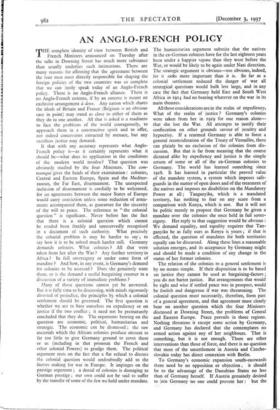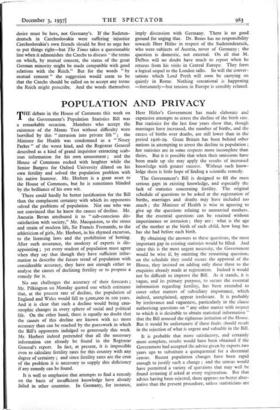AN ANGLO-FRENCH POLICY
THE complete identity of view between British and French Ministers announced on Tuesday after the talks in Downing Street has much more substance than usually underlies such intimations. There are many reasons for affirming that the agreement between the four men most directly responsible for shaping the foreign policies of the two countries was so complete that we can justly speak today of an Anglo-French policy. There is no Anglo-French alliance. There is no Anglo-French entente, if by an entente is meant an exclusive arrangement a deux. Any nation which shares the ideals of Britain and France (Belgium Is an obvious case in point) may stand as close to either of them as they do to one another. All that is asked is a readiness to face the problems of the world courageously, to approach them in a constructive spirit and to offer, not indeed concessions extracted by menace, but any sacrifices justice may demand.
If that with any accuracy represents what Anglo- French policy is—as it certainly represents what it should be—what does its application in the conditions of the modern world involve? That question was obviously studied by the four Ministers. The com- munzque gives the heads of their examination : colonies, Central and Eastern Europe, Spain and the Mediter- ranean, the Far East, disarmament. The. unexpected inclusion of disarmament is cordially to be welcomed, for no agreements between the major States of Europe would carry conviction unless some reduction of arma- ments accompanied them, as guarantee for the sincerity of the will to peace. The reference to " the colonial question " is significant. Never before has the fact that there is a colonial question which cannot be evaded been frankly and unreservedly recognised in a document of such authority. What precisely the colonial problem is may be harder to say ; to say how it is to be solved much harder still. Germany demands colonies. What colonies ? All that were taken from her after the War ? Any further territory in Africa ? In full sovereignty or under some form of mandate ? And how, in any event, is Germany's demand for colonies to be assessed ? Does she genuinely want them, or is the demand a useful bargaining counter in a discussion of a variety of immediate problems ?
Many of those questions cannot yet be answered. But it is fully time to be discussing, with minds rigorously divested of prejudice, the principles by which a colonial settlement should be governed. The first question is whether we are to base ourselves on expediency or on justice if the two conflict ; it need not be prematurely concluded that they do. The arguments bearing on the question are economic, political, humanitarian and strategic. The economic can be dismissed ; the raw materials which the African colonies produce atnount to far too little to give Germany ground to covet them or us (including in that ptonoun the French and other colonial Powers) to grudge them. The political argument rests on the fact that a flat refusal to discuss the colonial question would undoubtedly add to the factors making for war in Europe. It impinges on the prestige argument ; a denial of colonies is damaging to German prestige ; our own could not be said to suffer by the transfer of some of the few we hold under mandate. The humanitarian argument submits that the natives in the ex-German colonies have for the last eighteen years been under a happier regime than they were before the War, or would be likely to be again under Nazi direction. The strategic argument is obvious—too obvious, indeed, for it looks more important than it is. So far as a colonial settlement reduced the danger of war all strategical questions would bulk less large, and in any case the fact that Germany held East and South West Africa in 1914 had no bearing whatever on the war in its main theatres.
All those considerations are in the realm of expediency. What of the realm of justice ? Germany's colonies were taken from her in 1919 for one reason alone— that she lost the War. All attempts to justify their confiscation on other grounds savour of jesuitry and hypocrisy. If a rearmed Germany is able to force a general reconsideration of the Treaty of Versailles, there can plainly be no exclusion of the colonies from dis- cussion. But that is far from meaning that the course dictated alike by expediency and justice is the simple return of some or all of the ex-German colonies to Germany. The world has learned something since 1918. It has learned in particular the proved value of the mandate system, a system which imposes safe- guards in the matter of open doors and of the treatment of the natives and imposes no disabilities on the Mandatory Power at all ; Tanganyika, which is a mandated territory, has nothing to fear on any score from a comparison with Kenya, which is not. But it will not be politic merely to propose that Germany be given a mandate over the colonies she once held in full sover- eignty. Her reply to that suggestion would be obvious : We demand equality, and equality requires that Tan- ganyika be as fully ours as Kenya is yours ; if that is effected, the question of mandates for both territories equally can be discussed. Along these lines a reasonable solution emerges, and its acceptance by Germany might and should be made a condition of any change in the status of her former colonies.
The relation of the colonies to a general settlement is by no means simple. If their disposition is to be based on justice they cannot be used as bargaining-factors ; you do not barter justice. But arrangements that would be right and wise if settled peace was in prospect, would be foolish and dangerous if war was threatening. The colonial question must' necessarily, therefore, form part of a general agreement, and that agreement must clearly bear on another question which the four Ministers discussed at Downing Street, the problems of Central and Eastern Europe. Peace prevails in those regions. Nothing threatens it except some action by Germany, and Germany has declared that she contemplates no armed action against any of her neighbours. That is something, but it is not enough. There are other interventions than those of force, and there is no question that most of the unsettlement in Austria and Czecho- slovakia today has direct connexion with Berlin.
To Germany's economic expansion south-eastwards there need be no opposition or objection ; it should be to the advantage of the Danubian States no less than of Germany herself. If Austria genuinely desired to join Germany no one could prevent her : but the desire must be hers, not Germany's. If the Sudeten- deutsch in Czechoslovakia were suffering injustice Czechoslovakia's own friends should be first to urge her to put things right—but The Times takes a questionable line when it admonishes the Czechs to discuss " the terms on which, by mutual consent, the status of the great German minority might be made compatible with good relations with the Reich." But for the words " by mutual consent " the suggestion would seem to be that the Czechs should be called on to accept any terms the Reich might prescribe. And the words themselves imply discussion with Germany. There is no good ground for urging that. Dr. Benes has no responsibility towards Herr Hitler in respect of the Sudetendeutsch, who were subjects of Austria, never of Germany; the question is domestic, not external. On all that M. Delbos will no doubt have much to report when he returns from his visits in Central Europe. They form a logical sequel to the London talks. So will the conver- sations which Lord Perth will soon be carrying on quietly in Rome. Nothing sensational is happening —fortunately—but tension in Europe is sensibly relaxed.



























































 Previous page
Previous page